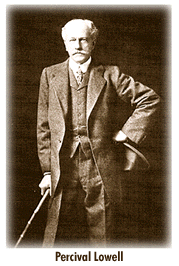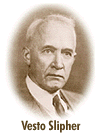Percival Lowell's Quest
 Percival
Lowell was born into an aristocratic Boston family, studied mathematics
at Harvard, and made a fortune in business. After traveling for ten years
to the Far East as a travel writer and serving as a foreign secretary, he
settled down to the serious pursuit of astronomy.
Percival
Lowell was born into an aristocratic Boston family, studied mathematics
at Harvard, and made a fortune in business. After traveling for ten years
to the Far East as a travel writer and serving as a foreign secretary, he
settled down to the serious pursuit of astronomy.
 Lowell
had become interested in studying what he thought were artificial canals
on Mars, and in 1894 established the Lowell Observatory in Flagstaff,
Arizona. Mars wasn't the only planet that interested him, and in 1905,
he began a search for the ninth planet.
Lowell
had become interested in studying what he thought were artificial canals
on Mars, and in 1894 established the Lowell Observatory in Flagstaff,
Arizona. Mars wasn't the only planet that interested him, and in 1905,
he began a search for the ninth planet.
Besides being able to apply his mathematical skills, Lowell had his own observatory at his disposal, something John Couch Adams had lacked when he predicted Neptune's position. Lowell's staff conducted a photographic survey of the sky, with Lowell's calculations thrown in to help narrow the search.
Lowell initially kept his search a secret, so that others might not steal his project. However, when the extreme difficulties of finding a planet became evident, Lowell was no longer worried about an opportunistic astronomer taking the glory, and by 1908 was publicly calling his elusive quarry "Planet X."
 By
1908, William Pickering was also conducting a search for what he called
"Planet O." Pickering had helped Lowell set up his observatory, though
he became rather critical of Lowell's ideas that Mars held intelligent
life.
By
1908, William Pickering was also conducting a search for what he called
"Planet O." Pickering had helped Lowell set up his observatory, though
he became rather critical of Lowell's ideas that Mars held intelligent
life.
Over the next eight years, Lowell applied himself and his staff with increasing vigor to the search. He hired Elizabeth Williams to help with the computations, and improved the equipment, upgrading his search with the 40-inch reflector telescope, the largest at the observatory. By the end of 1915, no planet had been discovered.
Lowell's discouragement deepened when the American Academy of Arts and Sciences declined to publish his paper on his theoretical and observational efforts to find the ninth planet. After this, Planet X was no longer mentioned in his writings.
By July of 1916, the photographic search ended. Ironically, Planet X appeared twice in this set of plates, but being much dimmer than predicted, it went unrecognized as the sought-after prize. On November 12, 1916, Lowell died of a massive stroke at his observatory.
Lowell's Legacy
 The search
for Planet X did not end with Lowell's death. His will provided for a million
dollars to support the observatory, and designated his assistant Vesto Slipher
as director of the observatory. Lowell also left quite a sum to his wife
Constance. The observatory staff was ready to use the observatory endowment
to carry on Lowell's work, but Lowell's widow was not enthusiastic about
this arrangement.
The search
for Planet X did not end with Lowell's death. His will provided for a million
dollars to support the observatory, and designated his assistant Vesto Slipher
as director of the observatory. Lowell also left quite a sum to his wife
Constance. The observatory staff was ready to use the observatory endowment
to carry on Lowell's work, but Lowell's widow was not enthusiastic about
this arrangement.
She contested the will, and by the time the court battles ended and the estate was settled in 1927, much of the money had gone toward legal fees. Still, Planet X waited, heedless of the problems that delayed its discovery. The observatory ordered a new 13-inch telescope, and prepared to resume Lowell's quest.